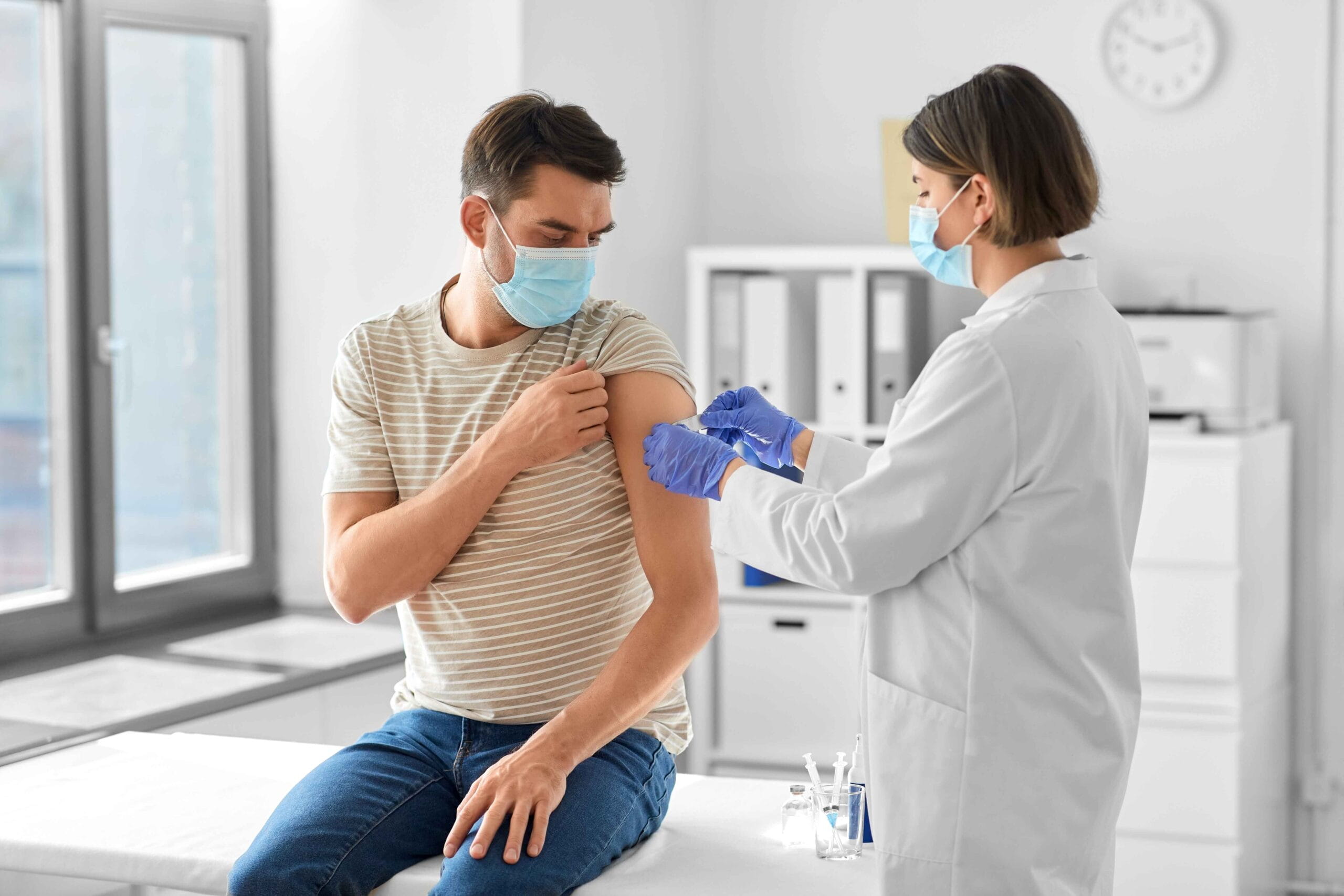Many men who train consistently and prioritize their fitness eventually look for ways to accelerate progress. Whether the goal is to build lean muscle, recover faster, or improve body composition, the idea of peptides often surfaces as a potential solution. These compounds have gained popularity in recent years among athletes, gym-goers, and health enthusiasts who are searching for a scientific edge.
But what are peptides really doing in the body? How much of their reputation is backed by evidence? And what are the real risks of using them?
In this guide, we’ll explore what the science says about peptides, the most commonly discussed types, and what men should know before considering them as an option to enhance their fitness goals.
What Are Peptides?
Peptides are short chains of amino acids, which are the same building blocks that form proteins. The main distinction is their size. While proteins typically can contain hundreds or thousands of amino acids folded into complex structures, peptides are much shorter and simpler.
Despite their small size, peptides play essential roles throughout the body. They act as signaling molecules, hormones, and regulators that help coordinate processes such as metabolism, tissue repair, and hormone production. (1) Some peptides communicate directly with the brain or endocrine system, while others affect the immune or digestive systems.
Synthetic peptides, created in laboratories, are designed to imitate or enhance the effects of naturally occurring peptides. (2) While dietary proteins provide amino acids that the body can use to produce peptides naturally, synthetic versions can be developed to target specific receptors or biological functions. While this makes them powerful tools in medicine and research, it also introduces questions about safety and regulation when used for personal use.
How Peptides May Support Muscle Growth
Peptides are often discussed in the context of muscle growth because of their potential connection to the growth hormone (GH) and insulin-like growth factor 1 (IGF-1) pathways. These two hormones are critical for cell growth, recovery, and protein synthesis.
Certain synthetic peptides, known as Growth Hormone Secretagogues (GHS) or Growth Hormone-Releasing Hormone (GHRH) analogs, are designed to encourage the body’s own natural GH release. Rather than supplying growth hormone directly, they stimulate the pituitary gland to produce more, which may help increase lean mass and support recovery. (3)
In certain cases, peptides may influence muscle development and recovery by:
- Stimulating natural GH and IGF-1 production to promote protein synthesis and muscle repair
- Enhancing recovery after intense training by supporting tissue regeneration
- Improving sleep quality, during which the body releases significant amounts of natural growth hormone
- Contributing to better workout endurance and shorter recovery periods
While these effects can be promising, not every peptide has been thoroughly tested in humans, and much of the research is preliminary. Because of this, extreme caution should be used and you should consult with your doctor before using peptides.
Commonly Discussed Peptides (Educational Overview)
At Gameday Men’s Health, we offer sermorelin and PT-141 as peptide options after consultation from a clinician. While some research has been done on other peptides, they are not yet widely available or approved. This table provides an overview of several of the most well-known peptides for muscle growth and recovery, and what studies have shown about their potential effects thus far.
The majority of peptides other than Sermorelin and PT-141 are unregulated and not approved for medical use in humans. Products purchased online or from unauthorized suppliers may be contaminated, underdosed, or mislabeled, which increases the risk of side effects and infection.
Risks, Regulatory Issues, and Safety Concerns
Peptides may sound like an exciting shortcut for muscle growth, but they come with significant risks when they are unregulated or when used without medical supervision. Many of the peptides circulating in the fitness community are considered “research chemicals” and have not been evaluated by the FDA for safety or efficacy.
Potential concerns include:
- Purity and contamination: Unregulated peptides may contain harmful impurities or inconsistent concentrations. (4)
- Labeling errors: The peptide advertised is not always the compound inside the vial.
- Lack of long-term safety data: Most peptides have not been tested in large-scale human studies.
- Side effects: Common reports include water retention, joint pain, insulin resistance, and in some cases, carpal tunnel symptoms. (5)
- Legal and athletic restrictions: The World Anti-Doping Agency (WADA) and most sports organizations prohibit the use of performance-enhancing peptides. (6)
- Injection risks: Improper technique or non-sterile handling can cause infection or abscess formation.
Men who are curious about peptides should always discuss options with a licensed healthcare provider, such as your local Gameday Men’s Health clinic. Using unregulated or improperly compounded peptides can lead to serious health issues that outweigh any potential benefit.
Realistic Expectations and What We Know Works
It is important to maintain realistic expectations when it comes to using peptides. While some peptides can play a role in supporting recovery or lean muscle development under medical supervision, they are not a substitute for the fundamentals.
The key drivers of muscle growth remain consistent training, proper nutrition, and quality rest. Men looking to build muscle effectively should prioritize:
- Consistent resistance training focused on progressive overload
- Adequate protein intake to fuel muscle repair and synthesis
- Sufficient sleep to support natural hormone production
- A nutrient-rich diet that provides energy and recovery support
When lifestyle habits are strong, clinically supervised peptide treatments such as Sermorelin can complement the body’s natural growth processes. Tracking progress through measurable data such as body composition scans, performance metrics, and blood work provides a more reliable picture of results than visual appearance alone.
At Gameday Men’s Health, the focus is on safe, medically guided hormone optimization that respects the body’s natural systems rather than trying to override them.
How Gameday Approaches Peptides
Gameday Men’s Health offers peptide treatments only when they are backed by scientific evidence and approved for medical use. The two peptides available through our clinics are Sermorelin and PT-141.
Sermorelin works by stimulating the pituitary gland to release more of the body’s own growth hormone. It is often used to support healthy hormone balance, recovery, and energy levels. Some research has also suggested sermorelin can be effective in improving bone density, boosting energy levels, and enhancing sleep quality. (7)
PT-141 is designed for an entirely different purpose, primarily helping to enhance libido and sexual performance through the melanocortin pathway. This can be an effective peptide for men dealing with the effects of erectile dysfunction as it has been shown to produce rapid, dose-dependent improvements in erectile function. (8)
At this time, Gameday does not promote or supply other peptides for muscle growth. Our philosophy centers on helping men achieve optimal health through proven, regulated therapies. Every protocol is personalized and carefully monitored through lab testing and follow-up visits to ensure safety and efficacy.
Rather than pursuing experimental compounds, our approach emphasizes restoring balance, improving energy, and supporting long-term wellness under medical supervision.
Questions to Ask if You Are Exploring Peptides
For men considering peptide therapy of any kind, education is the first step toward making an informed choice. Before using any peptide, it helps to ask a few key questions, such as:
- What peer-reviewed studies exist to support the peptide’s safety and efficacy in humans?
- What are the known side effects and contraindications?
- Is the product compounded by a licensed, GMP-certified pharmacy?
- Does the prescribing clinician have direct experience with peptide therapy?
How will the treatment be monitored to ensure safety and proper results?
Asking these questions helps separate legitimate medical care from unverified products and misinformation. If you’re unsure about the answer to any of these questions, or have questions about whether using a specific peptide is safe, it’s best to consult with a trusted medical professional.
Making Sense of Peptides for Real Results
Peptides are among the most discussed topics in performance enhancement and hormone optimization. While some of these compounds show potential for supporting muscle growth and recovery, most are still considered experimental and unregulated, making them extremely risky to use without medical guidance.
For men serious about improving their health, the most reliable path remains consistent training, balanced nutrition, and evidence-based medical support. Clinically supervised peptide therapies such as Sermorelin can enhance natural processes without unnecessary risk.
At Gameday Men’s Health, the focus is on helping men feel stronger, recover faster, and live healthier through safe, medically guided care. Peptides may hold promise, but smart, supervised strategies will always deliver the most sustainable results.
If you want to learn more about approved peptides like Sermorelin and PT-141, contact your local Gameday location to schedule a consultation.
References
- Peptide Hormone
- Synthetic Peptides as Protein Mimics
- Growth Hormone Secretagogue Receptor
- Unveiling the Hidden Dangers: The Risks of Using Unapproved Peptides for Health and Performance Enhancement
- Side Effects of IGF-1 Peptides: What to Watch Out For
- The Prohibited List
- Sermorelin for Muscle Building: Weighing the Pros and Cons
- PT-141: a melanocortin agonist for the treatment of sexual dysfunction











